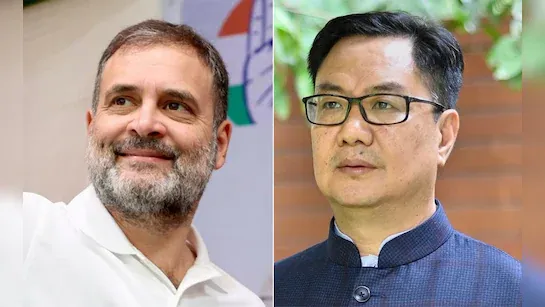
Kiren Rijiju: Union Minister has once again found himself at the center of India’s political spotlight after launching a sharp counterattack on Congress leader Rahul Gandhi. The heated exchange followed Gandhi’s recent claims of “massive vote theft” during the Haryana Assembly elections. Rijiju, known for his direct and unapologetic communication style, dismissed the allegations as baseless while accusing Gandhi of undermining democratic institutions and attempting to divert public attention from his party’s ongoing decline.
Rijiju’s response reflects not just a defense of his party, the Bharatiya Janata Party (BJP), but also a broader commentary on the political behavior of Rahul Gandhi, whom he accused of “running away during elections and returning only to blame others after losing.” His remarks have ignited yet another round of political debate, exposing the deep divisions between the ruling party and the Congress opposition at a time when India’s political climate is charged with election fever and public scrutiny.
Rijiju Questions the Credibility of Rahul Gandhi’s Allegations
Addressing a press conference at the BJP headquarters, Rijiju described Gandhi’s accusations as “fabricated stories designed to mislead the public.” According to the Union Minister, claims of 25 lakh fake votes in Haryana are not just exaggerated but also irresponsible. He emphasized that if Gandhi truly believed in the allegations, he should present concrete evidence before the Election Commission of India or the judiciary, rather than airing unverified claims in public forums.
This response underscores the BJP’s narrative that opposition leaders often use media platforms to shape misleading perceptions rather than following due legal or institutional processes. Rijiju’s tone was firm and dismissive, portraying the Congress leader as someone more focused on sensationalism than substance. His remarks also pointed out the inconsistency in Gandhi’s statements, accusing him of shifting political narratives depending on convenience rather than facts.
Allegations of Political Evasion and Misdirection
Rijiju’s criticism extended beyond the Haryana issue. He accused Gandhi of habitually disappearing from the political scene during critical periods, such as election campaigns or parliamentary sessions, only to resurface afterward with renewed criticism of the system. He referenced Gandhi’s alleged travels abroad during important national events, calling it a pattern of avoidance. According to Rijiju, these frequent absences signal a lack of seriousness and commitment toward leadership responsibilities.
He also linked Gandhi’s recent remarks about foreign affairs and social issues to a broader pattern of distraction, claiming that such statements are strategically designed to divert attention from Congress’s repeated electoral failures. Rijiju’s statements portrayed Gandhi as disconnected from grassroots realities and increasingly out of touch with India’s evolving political dynamics.
The 2004 Comparison and Democratic Ethics
Drawing parallels with the 2004 Lok Sabha elections, Rijiju reminded the audience that even when the BJP faced an unexpected defeat despite favorable exit polls, the party accepted the result gracefully and respected the mandate of the people. His point was clear—true democratic leadership requires both humility and respect for institutions, something he suggested the Congress leadership currently lacks.
By invoking this example, Rijiju positioned the BJP as a mature custodian of democratic values, contrasting it with what he described as the Congress party’s reactionary and accusatory approach. This rhetorical strategy not only strengthened his argument but also reinforced the BJP’s image as a party committed to stability, governance, and accountability.
The Youth Factor and India’s Political Future
Rijiju also used his address to appeal directly to India’s younger generation. He argued that despite Gandhi’s attempts to influence youth through populist messaging, India’s Gen Z voters are increasingly aligning with Prime Minister Narendra Modi’s vision of national progress and global recognition. According to Rijiju, today’s young Indians value results, discipline, and development over empty rhetoric.
He asserted that attempts to provoke young voters through anti-establishment narratives would fail because the youth recognize the government’s efforts in strengthening India’s global presence and economic growth. Rijiju’s remarks strategically positioned the BJP as the party of aspiration and modernity while framing the Congress as outdated and disconnected from contemporary realities.
Leadership Crisis Within the Congress Party
In his closing remarks, Rijiju claimed that even within the Congress party, dissatisfaction with Gandhi’s leadership is growing. He alleged that several senior Congress figures privately acknowledge that the party cannot revive as long as Gandhi remains at the helm. While such statements are not new in Indian political discourse, they highlight an ongoing internal struggle within the Congress—between legacy politics and the need for renewed strategy and leadership.
Rijiju’s words, though politically charged, echo a sentiment shared by political analysts who have noted the Congress’s repeated electoral underperformance and lack of a clear, unified narrative. His comments, therefore, not only served to attack Gandhi personally but also to question the Congress’s broader viability as a national opposition.
Conclusion
The verbal sparring between Kiren Rijiju and Rahul Gandhi is emblematic of India’s evolving political narrative—where media statements and public perception play as crucial a role as policy and performance. Rijiju’s counterattack was a calculated move to reaffirm the BJP’s confidence in democratic processes and to challenge the Congress’s credibility in the eyes of the electorate.
As India heads into more state elections, such confrontations are likely to intensify, with both parties seeking to shape the national discourse. For now, Rijiju’s remarks have once again put Rahul Gandhi and the Congress leadership on the defensive, highlighting a deepening divide in Indian politics over questions of responsibility, leadership, and democratic integrity.
-
World’s ‘most favorite country’ among most desirable destinations to relocate to

-
“Mummy Nahi Banane Dengi”: Internet Reacts To Chef Making Chai In Cooker

-
Hair has come out on shawl, sweater and cap, remove it in 5 minutes with these easy methods.

-
Former Meta employees launch a ring to take voice notes and control music

-
Bitcoin dips below $100,000 amid global sell-off; crypto market enters correction phase
